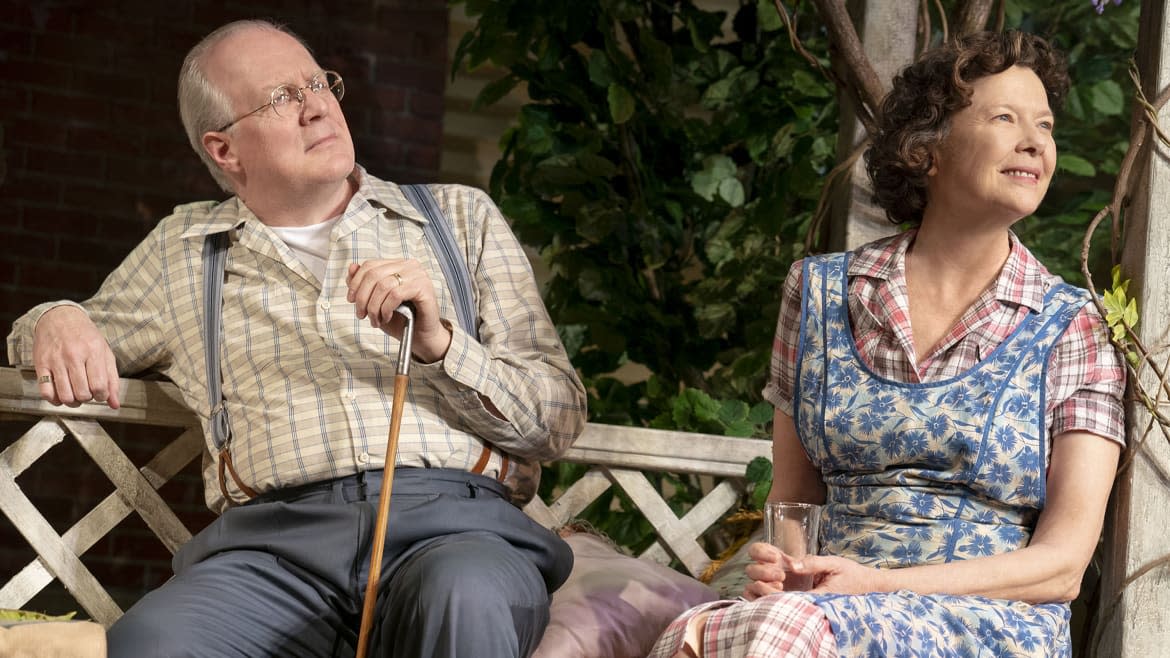Annette Bening in ‘All My Sons’: Arthur Miller’s Postwar Tragedy Lands Too Quietly on Broadway

There is the pleasure, for the first half anyway, of Arthur Miller’s All My Sons—which opened Monday night on Broadway (at the American Airlines Theatre, to June 23)—of well-executed theatrical convention; the reassurance of a revival done traditionally and done right.
First, lights begin to flash and thunderclaps ring out; we see a projection of a fighter plane going down.
The curtain rises on the aftermath of an August 1947 storm in Midwestern suburbia: Douglas W. Schmidt’s gorgeously designed bucolic backyard of grass and chairs and flower-covered arbor. We can hear the distant noise of cars and chatter; we can see the comings and goings in and out of the Keller family’s back door. There is nothing off-the-wall, no pushing of envelopes, or headline-making outrages. Directed by Jack O’Brien, this is a steady ship, entirely respectful of its source text.
In this garden it is Sunday morning, and newspapers are being perused by the play's men. The tree planted in memory of Larry Keller has been shorn in two by the storm. Matriarch Kate (Annette Bening) refuses to grieve for her son, presumed dead during World War II, because she refuses to believe he is dead.
The excellent Bening (stripped of any vestige of Hollywood glamor) plays Kate with a careworn stubbornness; she is not lost in misery, she lives in her own purgatory determinedly and will not be moved from it. She speaks in a controlled inscrutable tone—everything about her is controlled—and she is bolstered by the horoscopes of cheery neighbor Frank (Nehal Joshi), which also posit Larry is still alive.
Tracy Letts’ performance as patriarch Joe is, as you would expect from an actor who never lets you see the joins, brilliant and commanding. He has his own shame and secrets, his own desperation; the friendly chat with neighbors conceals a scandal. Joe was exonerated, while his neighbor Steve Deever was sent to jail, for knowingly shipping damaged aircraft engine cylinder heads.
Ann (Francesca Carpanini), Steve’s daughter, was Larry’s girlfriend and has now fallen in love with Larry’s brother (Benjamin Walker). Naturally, Kate is not thrilled about this.
The shadow of Larry and the war hangs over everything. “I had two sons, now I got one,” says Joe. “[The war] changed all the tallies. In my day when you had sons it was an honor. Today a doctor could make a million dollars if he could figure out a way to bring a boy into the world without a trigger finger.”
Chris wonders if they shouldn’t rouse Kate from her denial. “Do we contradict her? Do we say straight out that we have no hope anymore? That we haven’t had any hope for years now?”
Joe tells him: “She thinks he’s coming back, Chris. You marry that girl and you’re pronouncing him dead.”
Chris himself felt ashamed coming back from the war. “Because nobody was changed at all. It seemed to make suckers out of a lot of guys. I felt wrong to be alive, to open the bank-book, to drive the new car, to see the new refrigerator.”
For Joe, his only accomplishment, he feels, is Chris and all he does in service of that. His cheeriness is a cover, and the apparent folksiness of the neighborhood is deceptive too; next-door neighbor Sue Bayliss (Chinasa Ogbuagu) lets Ann know exactly what she thinks of the fallen Kellers. Her husband Jim (a wry Michael Hayden) has his own scratchy disillusion with the world.
There is something that melds the storylines—of Frank’s absence, Joe’s wartime secrets, and Chris and Ann’s intention to marry—for the first half. Walker and Carpanini are quietly charming as the would-be lovers, with Ann refusing to budge despite Kate’s animosity. But then Ann’s brother George (Hamilton Fluker) arrives, and so it is that everyone must face the truth of what really happened with those aircraft parts.
It is in this second half that the play starts to creak, and all that seemed grand and luxuriant in the first part begins to feel heavy-handed and rushed. Letts continues to ensure that Joe, the father who loved and screwed up too much, connects with the audience. It is Joe, with his self-sabotaged ambition for family stability, who now must face the meaning of being responsible for what happened to “all my sons.”
Walker’s horrified disillusion on discovering the many truths is the family‘s personal thunderstorm, but there is something too contained about his and the cascading reactions to the play’s set of secrets and truths. Some big lines and moments are galloped at, others don’t hit. The play’s central tragedy feels telegraphed. It's an uneven and unrevealing race to Miller's big messages.
Throughout, you sense the actors reaching for the grander scheme of Miller’s words—and what they say about family, justice, war, truth, morality, loyalty, profit, the American Dream—rather than simply living within their characters and letting those themes echo outwards. The moral and familial chaos Miller aimed to evoke feels too tidy, too beautifully lit, too just-so.
Letts stands out, going from folksy geniality to explosive anger, from reflective regret to defensive self-justification. He is a wonderful to both watch and also listen to. But with its tentativeness and restraint this extremely decorous All My Sons doesn’t shatter us enough, when it should have the same impact as the storm had on Larry Keller's tree.

